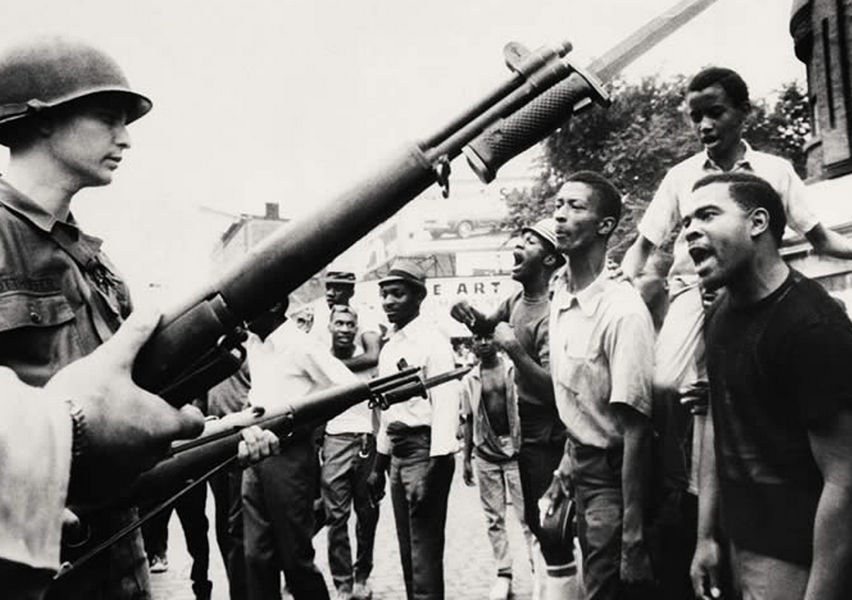‘40 YEARS AFTER: FILMING THE ’68 REVOLUTION’
When: Through Thursday Where: Facets Cinematheque, 1517 W. Fullerton
Admission: general public, $9; $5 for Facets members
Info: www.facets.org; Facets hotline (773) 281-4114
In 1968, at the height of the war in Vietnam, social upheaval seemed in the air. There was campus unrest, worldwide street demonstrations, the turmoil at the Democratic convention in Chicago. The year inspired a group of important documentaries and feature films, and starting, today, Facets Cinematheque will showcase them in a program titled “40 Years After: Filming the ’68 Revolution.”
I reviewed some of the films at the time. The most accomplished documentary, I think, is “The War at Home” (7 tonight), which uses TV news archives to re-create that time at the University of Wisconsin at Madison. The best feature is Haskell Wexler’s “Medium Cool” (7 p.m. Thursday) along with Louis Malle’s “May Fools” and “Wild in the Streets.” Other notable titles: “The Murder of Fred Hampton,” “Berkeley in the 1960s” and “Winter Soldier.”
At 10 a.m. Saturday, there will be a panel featuring directors and demonstrators who were in the middle of the ’68 convention uproar. Admission is $10.
A complete listing of all titles and show times, running through Thursday, is at www.facets.org.
For “40 Years After: Filming the 1968 Revolution,” Facets program director Charles Coleman selected 30 features and shorts made between 1968 and 2008. Most are documentaries are from the United States, but a few come from France and the Czech Republic. A Chicago point of view is furnished by Tom Palazzolo of Kartemquin Films and the Film Group.
“Hum 255” (9 tonight): The University of Chicago expelled 42 of the students who occupied the administration building for 16 days in early 1969. The protest was sparked by the firing of a feminist sociology professor. The next year, a class called “Humanities 255 and 256: Documentary Film Workshop” invited two of the expelled students back to discuss activism. “Hum 255” is the 16mm black-and-white record of a session fueled by wine and Oreos. Topics include the relevance of Black Panthers to whites and the irrelevance of an elite education.
Two of the filmmakers, Gordon Quinn and Peter Kuttner, will attend a panel discussion at 10 a.m. Saturday. Screening with “At the River I Stand,” an account of the 1968 strike by Memphis, Tenn., sanitation workers and the slaying of the Rev. Martin Luther King Jr.
“Reelvolution Shorts 1” (3 p.m. Saturday): Kartemquin Films gets a working-class angle on Chicago in 1974. This 21-minute short, subtitled “a black & white movie,” opens with a boxing match between a black youth and a white youth at Bessemer Park, 89th and Muskegon. Teens, young workers and Vietnam vets talk about overcoming divisions of race and class. Locations include Lawndale Park, Schurz High School and the former Schwinn Bicycle Co. Screening with two shorts made in 1968 by the Newsreel film collective.
“Revolution ’67” (5 p.m. Saturday): The July 1967 race riots of Newark, N.J., are examined by Marylou Tibaldo-Bongiorno. Her documentary began as a short fiction project mentored by Spike Lee at New York University and became a feature aired by PBS on its “P.O.V.” series. One intriguing detail: a photo of a “Negro sniper” published in Life magazine. Tom Hayden, then an inner-city organizer in Newark, says he spent “thousands of hours” trying to corroborate the inflammatory photo and failed.
“The Murder of Fred Hampton” (9:15 p.m. Saturday): Filmmakers Mike Gray and Howard Alk trace the ascent and alleged assassination of Fred Hampton, head of the Illinois chapter of the Black Panther Party. The 21 year-old orator and organizer was shot in his bed at 2337 W. Monroe before dawn on Dec. 4, 1969. Fourteen law enforcement officers fired 99 shots at him, according to a later inquiry. One shot was fired at the police from inside Hampton’s bedroom. This 1971 film is less compelling as investigative journalism than as an archive of political vernacular.
“Thumbs Down” (3 p.m. Sunday): Another vital cinema verite look into the soul of Chicago by Kartemquin filmmakers. In “Inquiring Nuns,” also released in 1968, Gerald Temaner and Gordon Quinn directed two nuns to ask random Chicagoans: “Are you happy?” The Vietnam War made many Chicagoans very unhappy. In “Thumbs Down,” the same filmmakers observe a teenage youth group in a Northwest Side parish plan a sermon. One hymn at their mass is Bob Dylan’s “Blowin’ in the Wind.” Parishioners get upset by a pimply faced kid, who asks: Do we “worship the God who created us, or do we worship the country we have created?” High school nurses will recoil at how much tobacco these earnest Catholic kids smoked in 1967.
“Reelvolution Shorts 2” (9 p.m. Monday): This free program includes “Generation 1968,” a French TV special by Simon Brook where Mick Jagger disses a demonstration: “It was very boring. There’s no politeness in anarchy.” Political junkies will like John Frankenheimer’s campaign film “RFK,” which shows Democratic presidential candidate Robert Kennedy speaking to voters. “I don’t think we have to accept the idea that summer after summer we’re going to have looting,” he says. Another short is titled “Up Against the Wall, Miss America.”
One of the most experimental films in Facets’ six-day lineup is “Campaign” by Chicago artist Tom Palazzolo. This 12-minute montage of city scenes free-associates on the 1968 Democratic convention. Traffic updates on the radio blend into a musique concrete score. What’s one shot Palazzolo missed? Cops overturned a Volkswagen bus bearing a peace symbol and clubbed it with their nightsticks.
Contributor: Bill Stamets, a locally based free-lance writer and critic.












